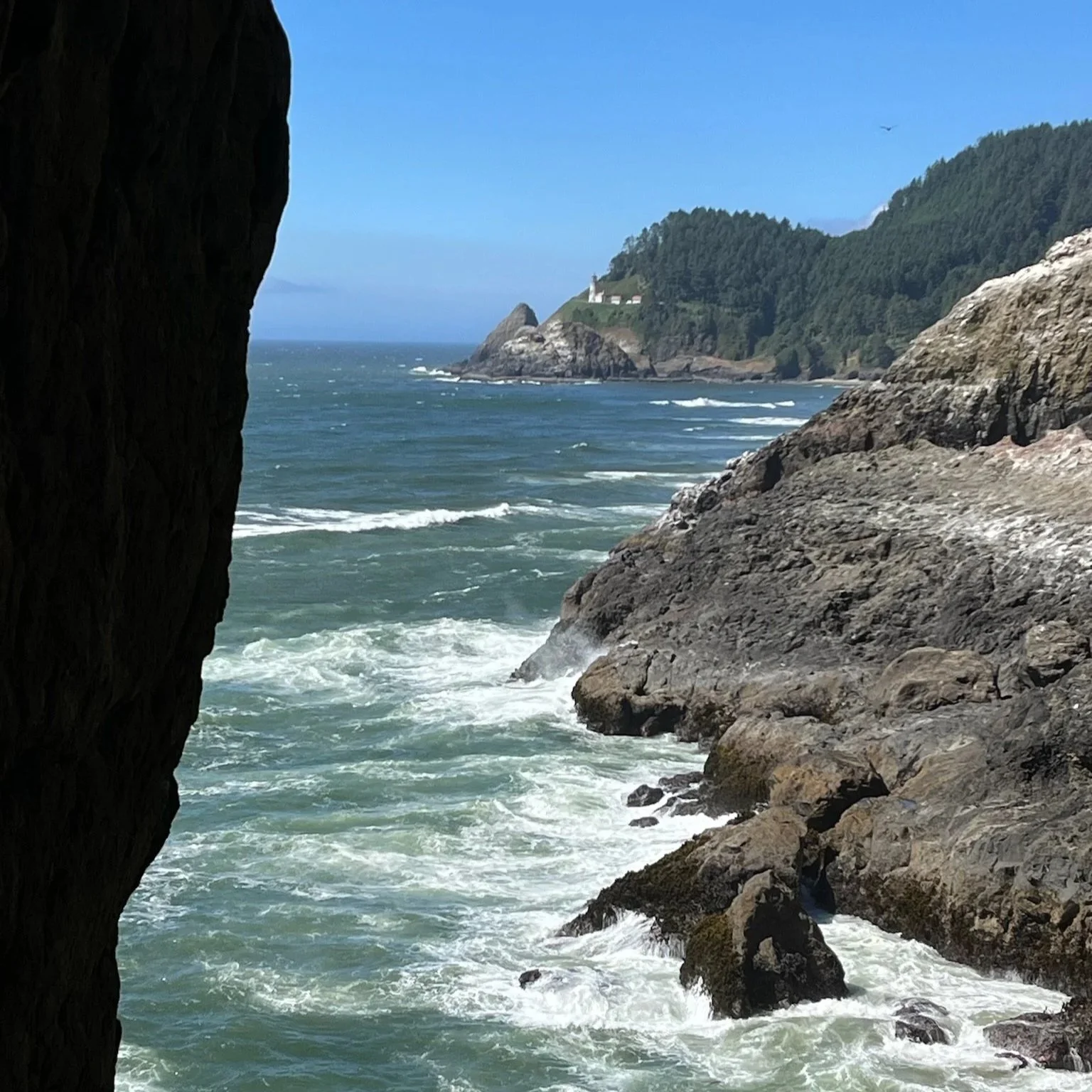The Water and the Dust (Found and Lost)
Note: The following is the transcript from my sermon yesterday at Emmanuel United Church of Christ. The text of the passage was Mark 1:9-15. As usual, it's not exactly what I said because I went off-book from time-to-time, but this is the gist of it.
One of my favorite TV shows of all time was Lost. I loved the writing, I loved most of the actors. I was even not highly offended by its controversial final episode. The story, initially, was about the survivors of Oceanic Flight 815 and their struggles on a mysterious island that included, among other things, polar bears, a smoke monster, a roving band of kidnappers, and so on. One of the things that Lost could do like no other show is pull the rug out from under you.
My favorite example—and you may want to cover your ears if you don’t want a seven year old television episode spoiled for you—is the third season finale. In order to help us get to know the characters better, the producers of Lost employed flashbacks in every episode. They were part of the show’s narrative DNA. These backstories shined a light on our characters actions and behaviors on the island.
The flashback of the third season finale followed a character as he was going through a difficult time. It was interesting because it didn’t seem to fit with what we had seen of that person’s history up to that point. But there was a reason for that. The last scene revealed that this wasn’t a flashback. It was a flashforward. He and another character had gotten off the island and the scene (and season) ended with him screaming at the other, “We have to go back!”
That’s the sense I got when I came to the gospel text for this week. Last week, we read about the Transfiguration in which God says to the disciples about Jesus, “This is my Son, the Beloved, listen to him!” The Transfiguration is a pivot point in Mark. They go down that mountain and the momentum carries them towards Jerusalem and Holy Week. I expected the lectionary to continue forward with that story.
But it doesn’t. Instead we come down the mountain and there is Mark standing there like a maniac screaming, “We have to go back!” And he takes us virtually back to the beginning of the gospel. It’s jarring. Of course, jarring is Mark’s specialty. The entire gospel careens forward with urgency. Mark loves the word “immediately.” Everything happens “immediately.” In today’s text, he uses the word twice. The entire gospel hurtles from scene to scene. If J.J. Abrams ever adapts one of the gospels, my money is on him tackling Mark’s action-packed take.
There is an interesting byproduct to Mark’s breakneck pace during this first week of Lent. This church, like many, follows the lectionary: a three year cycle of Old Testament, New Testament, Psalm, and Gospel readings which seeks to cover the majority of scripture. Each year, you go through a different gospel with John making special guest appearances in all the years. The gospel reading for the first Sunday of Lent is always Jesus being tempted for forty days in the wilderness, which makes perfect sense for this season. And when the lectionary follows Matthew and Luke, that is all there is to talk about.
But because Mark cannot sit still for more than a minute and his account of the wilderness temptation takes up all of two verses, our reading for this first Sunday of Lent includes Jesus’ baptism, the temptation in the wilderness, and the beginning of his ministry. In seven verses, Mark blazes through three major events that would be sermons in and of themselves.
Looking at this passage, I got whiplash. The tone shifts so quickly: from Jesus being told by God that he is loved to him struggling in the wilderness to boldly declaring the kingdom of God has come near. I was quite tempted to take the choose-your-own-adventure path and just run with one of these seemingly disparate threads. Yet the idea that this is a once-in-three-year opportunity to look at these events together was too much to resist. And the more that I thought about it, I realized that the up-and-down, found-and-lost nature of this passage is probably more true to our experiences in Lent and to our lives as a whole.
The baptism in Mark is only three verses. Mark makes no effort to explain away why Jesus would need to be baptized by John. He simply states that Jesus was baptized and that he had this incredible encounter with God. Immediately, as he comes out of the water he sees the heavens ripped open, the spirit descends on him like a dove, and he hears from God, “You are my son. You are the one I love. You bring me great happiness.”
These verses are dense with references to the Old Testament. Scholars look at what God says to Jesus and see a veritable Easter egg hunt. “You are my son” comes from Psalm 2:7-8, “Beloved” is believed to be a reference to Isaac in Genesis 22:1, and “with you I am well pleased” comes from one of the Suffering Servant passages in Isaiah. And then there’s the dove and I’ll just let the early church father John Chrysostom take this one over:
“[The Spirit] appears in the form of a dove, reminding us of Noah, to whom, when once a common disaster had overtaken the whole world and humanity was in danger of perishing, the dove appeared as a sign of deliverance from the tempest, and bearing an olive branch, published the good tidings of a serene presence over the whole world…. For this dove [in Mark] does not simply lead one family out of an ark, but the whole world toward heaven at her appearing.”
In this Old Testament scavenger hunt, Mark wants the reader to know that Jesus is the unique son of God, beloved, a suffering servant, and that his arrival signifies salvation from worldwide calamity. At the baptism, God affirms Jesus’ identity as son, reminds him that he is loved, and gives him a mission.
Though not as dramatic, our baptism affirms similar things. God adopts us. God declares that we are loved. God invites us to join a mission to bring love, hope, and peace to this world. Many times, I have heard the phrase “Remember your baptism.” I think that the idea is for us to never forget that moment or those moments in which God speaks to us in such a profound way. The thing about never forgetting is that the past stays alive. When you remember your baptism, it lives with you. It walks with you. You are not just remembering when you were made new, you are remembering that you are being made new.
So before we are pushed out into the wilderness, I want you to take a moment to remember your baptism. You could have been immersed, sprinkled, it does not even have to be a literal baptism. It does not even have to be a single event. The memories may be many. I remember being seven, wearing a white robe, and my socks being wet in a baptismal pool. I remember sneaking into the chapel in Furman and wrestling with God as my faith was maturing. I remember just a few weeks ago holding back tears in a Barnes and Noble begging God to not let me go and getting the sense that God would not let that happen. When are those times when you heard God speak to you? When are those times when you heard that you were loved by God? When did you sense that you were a part of something bigger? Take a moment and think about those times.
Hold on to those memories. Carry them with you. If you're a kinesthetic learner, you can even grip them in your hand.
Jesus was immediately driven out into the desert. In Mark, it’s pretty safe to say that this is still a part of the baptism story. He tells us that Jesus was tested by Satan for forty days. Forty is obviously an important number. It is not only the number of days in Lent, but it is the number of years the Israelites wandered in the desert, the number of days watery chaos enveloped the earth, and so forth. In scripture, forty represents periods marked by testing and a sense that God is far away. Mark also tells us that Jesus was with wild beasts, and was attended to by angels.
Again, Mark omits Matthew and Luke’s more robust narratives. There are no showdowns in which Satan offers a series of escalating temptations and Jesus drops Bible verses like action movie one liners which stop his enemy cold. Mark’s account of the wilderness testing is decidedly undramatic.
This is likely because Mark wants to get on to Jesus’ ministry: the real meat of the story. But the lack of specificity allows us to identify a bit more with the story. Most of us do not know what it is like for Satan to offer us the opportunity to rule all the kingdoms in the world if we bow down and worship him. Maybe you do. Let me know if you have. But the idea of being tempted and tested? The idea of feeling like God is far from us? The idea of coming face to face with our weakness and frailties? We get that. We’ve been there. Some of us are there. All of us will be there at some point in the future.
To a very true extent, this wilderness is where we live. It is where we try to survive. Yes, there are temptations out here, but there are also other obstacles that we have to overcome: sickness, death, the wrongdoing of others. We cannot avoid the wilderness and it is foolish of us to pretend that it doesn’t exist. So I want you to take a moment and reflect on your wilderness experiences. When are the times that you have screwed up? When are the times in which you have followed the way of Jesus the best that you can but you still feel like God seems distant? When are the moments when life has knocked you down? When has the grind of living life just worn you out? What are the questions that you have had? What are the doubts you’ve experienced? Take another moment and think about those times.
Hold on to those memories too. This is part of your story also. If you want to, you can grip then in your other hand.
The temptation narratives are important because it highlights that Jesus struggled and dealt with difficulties just as we did. We do not follow a God who is unfamiliar with our plight. The humanity of Jesus coupled with the fact that he came out the other end of this wilderness experience gives us hope. Jesus overcame the temptation and testing. He did not sin. He did not let the wilderness break him. He was able to come out of that desert and proclaim the kingdom of God.
How did he do that? Now if we were looking at the Matthew and Luke accounts, we would have the simple answer: knowing scripture helped him counter the enticement of evil. And I do not want to downplay that answer. Scripture—its instructions and the examples of the women and men that went before us—can be tremendously helpful as we face times of difficulty.
But, to play devil’s advocate (and acknowledging the irony of that statement in this context), we are not in Matthew or Luke. So if we just had this text before us, how might we surmise that Jesus passed through the wilderness unscathed? You could say, “Well, he was Jesus so of course he made it through the wilderness.” But that strips him of his humanity and also does us precious little good. The only thing I can gather from the text is that he clung to that experience at his baptism. He clung to it through those forty days until his knuckles were white. He remembered the water. It is water that keeps us alive when we traverse through the dry wilderness.
The river and the desert are both part of our experiences as we follow God. We are found in the waters of baptism and we are lost sometimes in the wilderness even after we come to faith. We are close with God and yet also far away. The waters of our baptism sustains us as we journey through the dry and difficult parts of life. But the dust and dirt of the wilderness keeps us grounded. It keeps our faith from floating away into super-spritualism. It helps us to see the ways in which we fall short of what God asks. It keeps us connected to the questions and heartache and the messed up nature of this world. It connects with people in the wilderness who need that water. If you have been holding on to those memories in your hands, bring them together.
Mark gives us a once in three year opportunity to not just look at Lent as a wilderness journey, but as all of these things that we hold together in our lives. We are flawed, but loved children of God. God is pleased with us yet still wants us to grow up and better love. We are already with God, but not quite yet.
One of the most meaningful times of the year for me is Ash Wednesday because it embodies these seemingly dissonant aspects of our faith: the spiritual and physical, our belovedness in God’s eyes and the frail fallenness brought on by our sin. We didn’t get to celebrate Ash Wednesday this year because we were iced out. I actually made an attempt at what I called Ice Wednesday with our two young sons. But the words that I heard when the ashes were put on my head last year still echo through my mind. My pastor administered the ashes and she said, “Remember that you are dust and to dust you will return. But remember Chris that you are loved. Repent and believe the gospel.” Remember that you are dust. That is the wilderness. Remember that you are loved. That is baptism. Repent and believe. That is our last stop.
Jesus comes out of the wilderness and things still are not great. John has just been arrested. Yet out of the alchemy of the wilderness and his baptism, Jesus preaches. This intensely personal spiritual journey is now turned outward and he declares: “The time has come, the kingdom of God has come near; repent and believe the good news!” Found and lost, experiencing intimacy with God and absence, brushes with divinity and frail humanity, Jesus carries a message that we all need to hear. God is breaking through in this earth. Even if it may not seem like it. Even if terrorists and the obscenely wealthy and the religiously prideful and those with hardened hearts do their best to drown out the good news, the kingdom of God is coming. So we must turn around, abandon the paths of selfishness and destruction that we may walk, and give our full attention to this arriving kingdom. We must repent and believe the gospel.
That is my encouragement to you this afternoon. As you hold together these disparate parts of your journey, I pray that you and I will repent and believe the gospel. That we will turn away from our sin, our selfishness, our prejudice, our apathy, and walk the way of Jesus. And that we would believe the gospel deep down in the depths of our soul. It is not just an intellectual assent. It is something that transforms us. To believe the gospel is to believe that God loves us and those around us and that God desires for peace, hope, and love to fill this earth in real and tangible ways.
Whatever you are doing during Lent—whether you are fasting or not fasting, whether you have taken on some sort of spiritual discipline—I encourage you to reflect on your personal spiritual journey and then seek ways to turn that outward. Seek ways in which you can live a life of repentance. Seek ways in which you live in a way that demonstrates that you believe the good news. In Mark, no one hears the voice from heaven at baptism, no one saw his struggles in the desert, but they knew about them because of how he lived. May others know what God has done for us by how we live as well.










